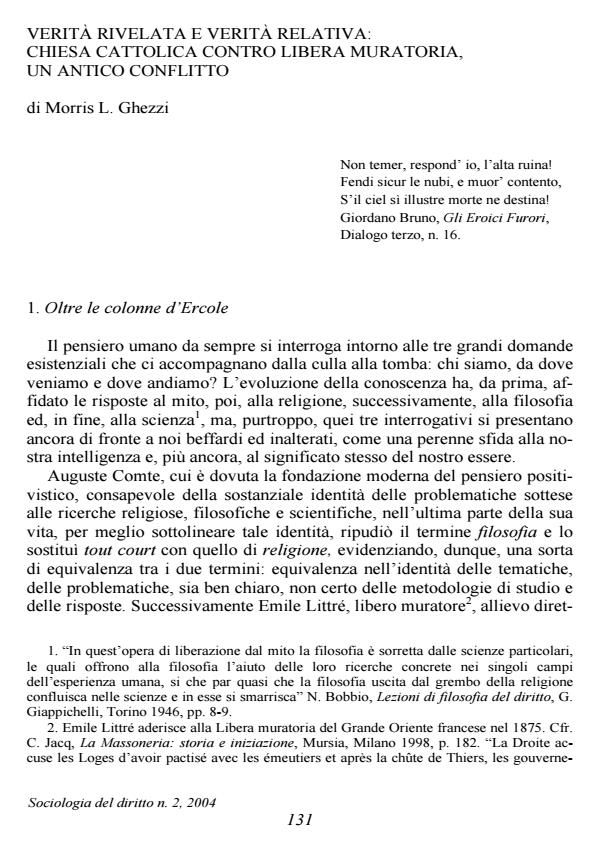Verità rivelata e verità relativa: Chiesa cattolica contro Libera muratoria, un antico profitto
Journal title SOCIOLOGIA DEL DIRITTO
Author/s Morris L. Ghezzi
Publishing Year 2004 Issue 2004/2
Language Italian Pages 22 P. File size 86 KB
DOI
DOI is like a bar code for intellectual property: to have more infomation
click here
Below, you can see the article first page
If you want to buy this article in PDF format, you can do it, following the instructions to buy download credits

FrancoAngeli is member of Publishers International Linking Association, Inc (PILA), a not-for-profit association which run the CrossRef service enabling links to and from online scholarly content.
Written against the historical backdrop of the thoroughly Italian conflict between the Catholic Church and Freemasonry, this article tackles the topic of freedom of thought. Freemasonry puts the individual in the centre of its thinking and gives him the right of self-determination, i.e. it gives him autonomous capacities. The Catholic Church, on the contrary, draws clear borderlines between orthodoxy and heresy, then condemns the latter. The historical conflict between these two organisms has thus been based on the presumptions of truth advanced by the Catholic Church, as opposed to the individual’s freedom of thought propounded by the Freemasons. As the evidence of history shows only too clearly, there is indeed in the author’s view a very short step from the declaration of the concept of heresy to its violent repression, by means of Crusades, the tribunals of the Inquisition, censorship, the Index and so on. The philosophy of the Catholic Church contains a perilous germ that encourages the birth and development of intolerance: the concept of revealed truth. If this truth makes its way into the world of men at a given moment in history and excludes all other truths, then anyone who stands against it automatically finds himself in the wrong, so may legitimately be admonished, judged negatively, condemned and even killed. In the course of history, this antagonism and incompatibility have left a long trail of blood at the door of the Catholic Church, which only very recently, in the second half of the twentieth century, attempted to make up for lost time, adopting such concepts as human rights as if they were its own. Such overdue repentance appears to the author as instrumental and hardly reliable if not supported by an adequate, coherent and credible conceptual apparatus.
Morris L. Ghezzi, Verità rivelata e verità relativa: Chiesa cattolica contro Libera muratoria, un antico profitto in "SOCIOLOGIA DEL DIRITTO " 2/2004, pp , DOI: